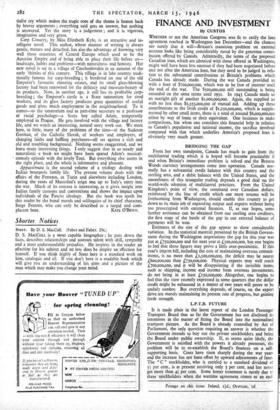FINANCE AND INVESTMENT
By CUSTOS
WHETHER or not the American Congress sees fit to ratify the loan agreement reached in Washington last December—and the chances are surely that it will—Britain's transition problem on external account looks. like being considerably eased by the generous contri- bution offered by Canada. Admittedly, the terms of the proposed Canadian loan, which are identical with those offered in Washington, might well have been less onerous if they had been negotiated before and not after the American loan, but they need to be judged in rela- tion to the substantial contributions to Britain's problems which Canada has already made. During the war Canada provided us with a loan of $700,000,000, which was to be free of interest-until the end of the war. The $5oo,000,000 still outstanding is being extended on the same terms until 1951. In 1943 Canada made us an outright gift of another $1,000,000,000. Again, she supplied us with no less than $1,555,000,000 of mutual aid. Adding up these contributions to the fresh credit of $1,25o,000,000, which is supple- mented by other small items, there is a total of around $6,Oon,000,000
either by way of loans or their equivalent. One hesitates to make comparisons, but when one considers this financial help in relation to Canada's population and national income, the sacrifice involved compared with that which underlies America's proposed loan is obviously very much greater.
BRIDGING THE GAP
From her own standpoint, Canada has much to gain from the multilateral trading which it is hoped will become practicable' if and when Britain's immediate problem is solved and the Bretton Woods currency -"arrangements come into operation. Canada nor- mally has a substantial credit balance with this country and the sterling area, and a debit balance with the United States, and the smoothness of this triangular trading depends a good deal on the world-wide adoption of multilateral practices. From the United Kingdom's point of view, the command over • Canadian dollars, reinforced by the line of credit which one must assume will be forthcoming from Washington, should enable this country to get down to its main job of expanding output and exports without being too preoccupied with external finances. If, as one hopes, some further assistance can be obtained from our sterling area creditors, the first stage of -the battle of the gap in our external balance of payments will be won.
Estimates of the size of the gap appear to show considerable' variation. In the statistical material presented by the British Govern- ment during the Washington negotiations the gap for this year was put at L75cc000,000 and for next year at k500,000,000, but one begins to feel that these figures may prove a little over-pessimistic. If this year's import bill, including the cost of maintaining overseas gommit- ments, is no more than Li,soo,000Aioo, the deficit may be nearer £600,000,000 than L750,000,000. Physical exports may well reach £7oo,000,000, and it 'will be disappointing if the invisible items, such as shipping, income and income from overseas investments, do not bring in at least £150,000,000. Altogether, one begins to feel that the view recently expressed in some quarters that the dollar credit might be exhausted in a matter of two years will prove to be unduly sombre. But everything depends, of course, on the export drive not merely maintaining its present rate of progress, but gaining fresh strength.
L.P.T.B. FUTURE
It is made plain in the latest report of the London Passenger Transport Board that so far the Government has not disclosed its intentions in the matter of fitting the Board into the nationalised transport picture. As the Board is already controlled by Act of Parliament, the only question requiring an answer is whether the Government intends to buy out the private stockholders and bring the Board under public ownership. If, as seems quite likely, the Government is satisfied with the powers it already possesses, the problem will be to re-establish the Board's finances on a self- supporting basis. Costs have risen sharply during the ,war years and the increase has not been offset by upward adjustments' of fares. The " C " stockholder, who is entitled to a standard dividend of 51 per cent., is at present receiving only 3 per cent. and has never got more than 44- per cent. Some better treatment is surely due to these stackholders when the wartime agreement comes to an• end.


























 Previous page
Previous page